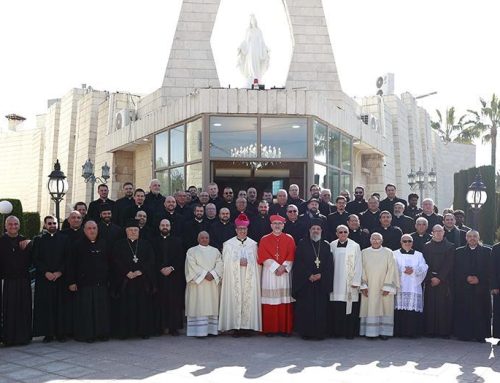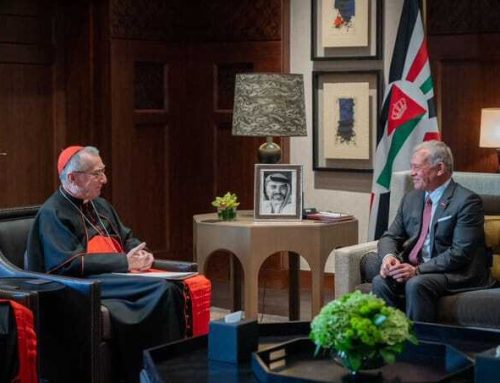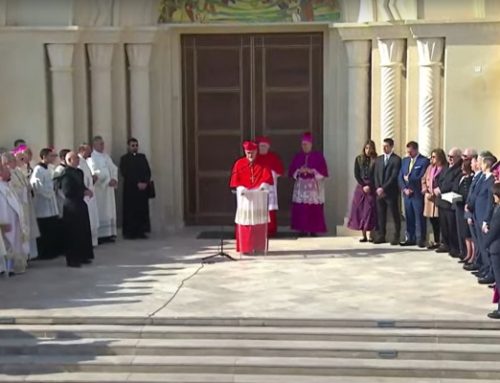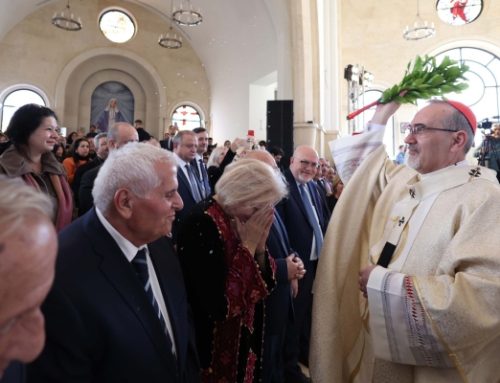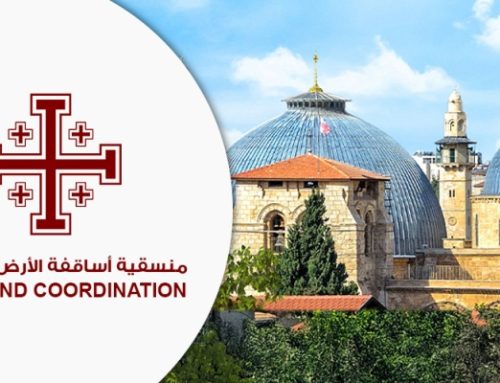I am enclosing herewith the Report of the Ad Hoc Committee charged with examining the problem of Catholic religious personnel whose visas have been requested from the Ministry of the Interior of Israel but have not yet been granted.
H.E. Archbishop Pietro Sambi
Apostolic Delegate
Shmuel Ben Adaya Street
P.O. Box 19199
91191 Jerusalem
Your Excellency,
I am enclosing herewith the Report of the Ad Hoc Committee charged with examining the problem of Catholic religious personnel whose visas have been requested from the Ministry of the Interior of Israel but have not yet been granted.
The Committee recommends that the report be brought to the immediate attention not only of the proper officials in the Israeli Government but also of the Holy See, the various episcopal conferences around the world, and the international press. It further recommends that remedy be sought through the Israeli Courts, as high as the High Court of Justice if need be, if redress is not obtained through diplomatic channels.
Hoping that the report will be found useful, I wish to thank you in the name of the Committee for the kind attention you will give this matter. Please accept my very best wishes.
Sincerely yours,
Rev. Robert J. Fortin, A.A.
For the Committee
cc: H.B. Patriarch Michel Sabbah
Report
Catholic Ad-hoc Committee
Denial of Freedom of Religion
As guaranteed by the Fundamental Agreement
Between the Holy See and the State of Israel
Part I
Visas requested by Catholic Religious Personnel
But not yet granted by the Israeli Government
Jerusalem
March 22, 2003
Introduction
Recalling its earlier commitments to the principle of Freedom of Religion, the State of Israel recommitted itself to this principle in the Fundamental Agreement Between the Holy See and the State of Israel signed on December 30, 1993:
“The State of Israel, recalling its Declaration of Independence, affirms its continuing commitment to uphold and observe the human right to freedom of religion and conscience, as set forth in the Universal Declaration of Human Rights and in other international instruments to which it is a party.” (Article 1)
Freedom of Religion would be a “phantom freedom” if the State did not allow the Church to engage in its proper activity. For that reason, the Agreement went on to guarantee the Catholic Church the right to carry out its own functions, inter alia, the right to “train, appoint and deploy its own personnel”:
“The State of Israel recognizes the right of the Catholic Church to carry out its religious, moral, educational and charitable functions, and to have its own institutions, and to train, appoint and deploy its own personnel in the said institutions or for the said functions to these ends. The Church recognizes the right of the State to carry out its functions, such as promoting and protecting the welfare and the safety of the people. Both the State and the Church recognize the need for dialogue and cooperation in such matters as by their nature call for it.” (Art. 3, § 2)
The Agreement also guarantees that the Church will have freedom of worship, the right to establish, maintain and direct schools of study at all levels, and the right to carry out its charitable functions:
“The State of Israel agrees with the Holy See on the continuing guarantee of the freedom of Catholic worship.” (Art. 4, § 4)
“The Holy See and the State of Israel jointly reaffirm the right of the Catholic Church to establish, maintain and direct schools and institutes of study at all levels; this right being exercised in harmony with the rights of the State in the field of education.” (Art. 6)
“The Holy See and the State of Israel jointly reaffirm the right of the Catholic Church to carry out its charitable functions through its health care and social welfare institutions; this right being exercised in harmony with the rights of the State in this field.” (Art. 9)
The State of Israel gave further indication of its commitment to Freedom of Religion when it gave legal personality to the various churches, institutes of Consecrated Life and other official entities of the Catholic Church in the Legal Personality Agreement signed on November 10, 1997.
However, for nearly two years, Israel’s Ministry of the Interior has refused to grant entry visas and renewals of residence permits to a large number of Catholic priests, nuns, seminarians, and volunteers.
The present report will demonstrate that this practice has become so extensive and affects so many Church institutions, including key areas such as its major seminary, that the Israeli government is now in material breach of the principle of Freedom of Religion guaranteed by its Declaration of Independence, the Universal Declaration of Human Rights, and the Fundamental Agreement.
Part I of the present report examines first of all the applications themselves, noting their number, the dates on which they were submitted to the Ministry, and the problems encountered by the applicants. It then draws attention to the Churches, religious orders and Church institutions affected by the government policies. Finally, it states some of the consequences of the government’s policies on the Catholic Church in the Holy Land.
Part II provides a partial listing of applicants whose requests have not yet been granted.
I. Applications for entry visas and residence permits
A. 86 (108) visa applications pending
A recent survey conducted among the different Catholic Churches present in the Holy Land, including the religious congregations of men and women and the various institutions that come under their jurisdiction, reveals 86 applications for entry visas and residence permits for religious personnel that have been requested but have not yet been granted (see Part II for a partial list of applicants, as of the date of this report). They include 36 men and 50 women from 13 countries. The number of such applications is therefore considerable and, as explained below, is having serious effects on the Catholic Church in Israel and the Palestinian Territories.
The figures are nevertheless partial and incomplete because they do not include:
1. The names of religious personnel or volunteers who were denied an entry visa and who therefore were never allowed to enter the country;
2. The names of those who had been living in Israel for several years and who were either obliged to leave the country or who, having left for whatever personal reasons, were not allowed to return;
3. The names of those who have been living in Israel for several years and whose requests were eventually granted, though only after a long delay and multiple visits to the Ministry of the Interior.
4. The names of 22 Jordanian seminarians in Beit Jala whose residence visas will expire between May 13 and September 1, 2003 and will apparently not be renewed, if the government’s current policy does not change in the meantime. This will increase the total number of problematic visas from 86 to 108.
B. Dates on which applications were made
The pending requests that have not yet been granted were submitted over a period of time extending from March 2001 to date, 56 of them since October 2002, including 15 in December 2002. See Appendix 1 (page 10) for details.
C. Problems encountered by applicants
1. Discrimination based on country of origin
The religious personnel whose cases are pending come from 13 different countries:
* 70 from neighboring Arab countries: Jordan (29), Lebanon (23), Syria (9), Iraq (6), and Egypt (3), making for 81% of the total. That figure rises to 82.5% when a French citizen born in Algeria but holding a French passport is added to the list. It rises to 85% when the 22 Jordanian seminarians are also added.
* 4 from India and 2 from the Philippines, or 7%.
* 5 from African countries: Rwanda (3), Mali (1), Burkina Faso (1), or 6%.
* 3 from Eastern Europe: Poland (2), Slovakia (1), or 3%
* 1 from Western Europe (France), or 1.5%
It should be noted that religious personnel coming from Third World countries generally encounter many obstacles and delays in obtaining visas.
In the present political context, the Church in the Holy Land understands perfectly well that the State of Israel must take all of the security measures it deems necessary to protect its own safety and that of its citizens. However, it finds unjustified the indiscriminate application of these measures to the religious domain:
* All of the Catholic religious congregations and institutions in the Holy Land are not only publicly known, their name and address appearing in the Annuaire de l’Eglise Catholique en Terre Sainte, the contents of which are known to the Ministry, but they have also been given legal personality by the State of Israel in the Legal Personality Agreement mentioned above in the Introduction.
* The Catholic religious personnel do not come to the country for unknown purposes and dangerous activities but exclusively “for religious, moral, educational and charitable functions” (cf. Fundamental Agreement).
* The local religious superior, who presents the application for an entry-visa or a residence permit, assumes complete responsibility before the Israeli authorities for the conduct of the persons in question.
* The Catholic religious personnel from neighboring Arab countries receive from the Diplomatic Representation of the Holy See a Laissez-passer, but only after having accurately verified that for each case the motive for entry or residence is exclusively for “religious, moral, educational and charitable functions.”
However, the recommendations of the Diplomatic Representation of the Holy See and of the religious superiors are often ignored, thus putting in question the reliability of Church officials and disregarding the legal personality of the institutions to which the personnel are affiliated.
2. Deprivation of rights
Over the years, many of the older religious have regularly contributed to “Bituah leumi.” When they now find themselves without a visa, they cease to have the right to receive their pension checks and to be entitled to the government’s health insurance program. From what will they live?
Some of the elderly religious who are now being harassed have lived in the country all of their lives. It is unconscionable that they should suddenly find themselves without a visa.
3. Confusion between foreign workers and Church personnel
In its effort to exclude and/or deport foreign workers in response to a perceived “explosion” of foreign workers entering the country (25,000 were deported in the last 6 months), the Interior Ministry has not made any distinction between Christians seeking to study and serve in the Holy Land and the foreign workers it is attempting to keep out. In so doing, it has in fact infringed upon the religious freedom of Catholics, denying the Church the rights guaranteed by the Fundamental Agreement “to carry out its religious, moral, educational and charitable functions, and to have its own institutions, and to train, appoint and deploy its own personnel in the said institutions.”
It should be noted that those who serve and study in Catholic institutions of whatever kind do not in fact take jobs away from Israelis.
4. Contradictory policies followed by different Ministries of the Government
Except for the few cases that were submitted to Israeli embassies in foreign countries, the vast majority of the requests was submitted in Jerusalem and followed standard procedures. They were submitted first to the Ministry of Religious Affairs, the ministry most knowledgeable about the Catholic Church, where they were authenticated as coming from a known and recognized Catholic institution, and where they received a favorable recommendation. They were then forwarded to the Ministry of the Interior, which ignored the recommendation of the Ministry of Religious Affairs, choosing to either deny or indefinitely delay granting the request. Consequently, the policies and criteria of the two ministries of the same government were clearly in contradiction one with the other.
5. Applicants are often given the runaround
Applicants are routinely given evasive excuses and subjected to a series of delaying actions in response to their repeated requests. Typically, they are given no reasons but are told to come back in three weeks or a month for an answer. When they return three weeks or a month later, they are again told to come back in three weeks or a month, and so on, month after month after month. In the process, they lose many days standing in line at the Ministry of the Interior and are left in legal limbo. In the long run, the procedures are humiliating.
When current temporary residence permits are coming to expiration, applicants are regularly told to apply for renewal not more than one month before the expiration date. Yet, the renewal process, when successful, often takes many months, leaving applicants unwillingly in an illegal situation for a long period of time.
Some religious congregations run into enormous problems when requesting eight-day visas for Arab sisters coming to attend regional meetings of the order. When they ask one month ahead of time, they wait and wait. If and when the visas are eventually granted, they arrive too late for the meeting. When the Order asks two months ahead of time, the visas arrive too early and expire before the meeting takes place. When the Ministry mails the visas, they never arrive on time.
6. Changing of visa category suddenly prohibited
For years, it was allowed to change from one visa category to another, e.g., from A-2 (student) or B-2 (tourist) to A-3 (clergy). In fact, application form # 15 was entitled “Application for the Extension of Permit of Residence / Change of Visa Category.” Then, suddenly and without warning or explanation, it became very difficult, if not impossible, to change category. Applicants were told that if they wanted to change category, they had to return to their country of origin and there apply for a new visa at the Israeli Embassy. As applied to church personnel, the new policy is unreasonable:
* In the case of seminarians coming from whatever country to study for the priesthood in one of the local dioceses or religious congregations, they first receive an A-2 (student) visa during their years of theology. It is unreasonable to oblige them to return to their country of origin to obtain an A-3 visa (clergy/religious) after ordination or definitive incorporation into the religious order as they pass from student to ordained priest or vowed religious.
* In the case of monasteries of contemplative men and women, prospective candidates often come for initial interviews and for a trial period. At first, they do not know if they will stay, so they request a B-2 tourist visa. If they decide to prolong their period of observation or to request entrance into the order’s formal training program (novitiate), they are now obliged to return to their country of origin in order to obtain an A-2 or an A-3 visa. The requirement is unreasonable, all the more so if they come from a far-distant country.
* In the case of students who come to attend an educational institution of higher learning in view of a short-term course for which a B-2 tourist visa is sufficient, but who then decide to opt for more formal long-term programs, there is no reason why they should be obliged to return to their country of origin to change from B-2 to A-2.
The present ruling forbidding the change of visa category is unreasonable as applied to church personnel.
7. Substitution of a tourist B-2 visa for a requested clergy A-3 visa
On 15.01.03, one member of a religious institute, after receiving a letter from her religious superior and the recommendation of the Ministry of Religious Affairs, requested a religious A-3 visa for one year. At the office of the Ministry of the Interior and without any explanation, she was asked to change her application despite her written and oral explanation that she had come to Jerusalem for religious purposes. The Ministry refused her application and gave her a tourist B-2 visa for 6 months rather than the religious A-3 visa she had requested for one year.
8. Permanent residents: A-5 visas
An Israeli regulation allows holders of A-3 visas who have been in the country for 15 years or more to apply for A-5 temporary resident visas, which give them a few more rights, including the right to work. Recently, the Interior Ministry has stopped granting such visas.
9. Volunteers: B-1 visas
Many Catholic institutions, especially hospitals and charitable organizations but also a few religious orders, rely on foreign volunteers to help them in their endeavors. In exchange for services, the volunteers receive lodging and small stipends as pocket money but do not receive salaries. This allows the institutions to retain their Christian character and to keep expenses down. In recent times, the Interior Ministry has ceased to grant B-1 visas to volunteers, erroneously assimilating them to foreign workers and thereby causing additional staffing and financial difficulties for the institutions involved.
In a recent case, an elderly volunteer who has been in the country since August 2000 at the service of a cloistered monastery of nuns was given on March 17 a tourist B-2 visa valid for only one month and was told that he had to leave the country at the end of that period. The monastery is being deprived of a reliable and trustworthy helper who speaks the language of the sisters and who is certainly not taking the job of any local job seeker.
10. Arbitrariness and rudeness – absence of standard procedural norms
The employees at the Ministry do not all apply standard objective norms but are often given to arbitrariness, each one seemingly having the right to invent his/her own rules according to the mood of the day. At times, treatment is rude and arrogant, leaving the impression that Catholic religious personnel are unwelcome in the country and reinforcing the idea commonly held, rightly or wrongly, that ideological reasons lie behind the denials and delays. There is therefore an urgent need for standard procedural norms followed by all Ministry employees and clearly brought to the attention of all Church institutions so that everyone knows what to expect.
11. Unsatisfactory reasons given for the refusals and delays
Various explanations have been put forward in the press and elsewhere offering excuses for these problems, but none are satisfactory. It has been alleged that the policies were those of the Shas Party, not those of the government, and that they were not specifically directed against Christians since non-Christians and even non-Orthodox Jews also encountered them. The argument is irrelevant because ministries are branches of a single government, represent that government in the area of their competence, and, by definition, carry out its policies.
Moreover, the signatory to the Fundamental Agreement with the Catholic Church was the Israeli Government as such, not any specific political party. Unless mutually agreed upon, the present Agreement binds all governments of whatever orientation. Also, Israel is known the world over for its ability to operate efficiently when it so desires and when its own interests are at stake.
II. Churches and religious orders affected by government policies
(See Appendix 2[page 11] for detailed listing)Three Catholic Churches are affected by present government policies: the Latin Church, the Greek-Melkite Church, and the Maronite Church:
* In the Latin Church: 13 members of the diocesan clergy (6 priests and 7 seminarians), and 63 members of 18 religious orders: 22 men and 41 women.
* In the Greek Melkite and Maronite Churches: 10 members of 2 religious orders, one from each Church.
By and large and merely in terms of numbers, the most seriously affected are the Franciscan Custody (15 members), the Latin Patriarchate (13 members) and the Franciscan Sisters of the Immaculate Heart of Mary (13 members). However, the statistics do not tell the whole story because, in terms of percentages of total membership, many of the smaller religious orders are hurt just as badly as the larger ones. Also, as will be seen below, the situation of the patriarchal seminary in Beit Jala is particularly critical and urgent, all the more so that the visas of 22 more seminarians will soon be coming to expiration and will bring the seminary’s total up to 29.
III. Types of work affected by government policies
(See Appendix 3 [page 12] for detailed listing)The types of work in which one or more visa applicants is/are affiliated are extremely varied. In fact, they involve almost the entire gamut of the Church’s activity in the Holy Land. It follows that the Church’s activity is very seriously impacted by the Government’s current policies. The affected areas include:
General diocesan administration of the Latin Patriarchate
Top level administration of religious orders (major superiors)
Educational institutions at all levels (teachers and students)
Seminaries and religious training (seminarians, novices, postulants)
Retreat Centers and continuing education of religious personnel
Parishes (pastors and assistant pastors)
Student residences and guesthouses
Hospitals (staff)
Monasteries of contemplatives religious men & women
Retirement homes for the aged
Work with the poor and disadvantagedIV. Consequences of the government policies on the Catholic Church
Contrary to the spirit of mutual respect and cooperation mentioned in the Fundamental Agreement (Art. 3, § 2), and contrary to the provisions of Article 10, § 2 (a) and (d) of this same Agreement regarding unsettled and disputed questions, the State of Israel has unilaterally, without consultation and discussion, adopted far-reaching policies affecting the implementation of the Agreement regarding Church personnel. Incompatible with it, the present policies:
1. Curtail the right of the Church to train, appoint and deploy its own personnel in its institutions. Consequently, critical aspects of the life of the Church are being hampered, from the upper-most levels of Church administration, to the daily operations of a wide variety of its institutions.
2. Infringe upon the right of the Church to establish, maintain and direct schools and institutions of study at all levels from kindergartens to schools of theology and advanced graduate studies.
3. Impinge upon the life of monasteries and religious communities by making it difficult for Christians from many foreign countries around the world to join their ranks.
4. Make difficult the entry into the country of students from many other countries who wish to come to the Holy Land for spiritual renewal and biblical studies. Because Christianity was born in this land, Christians from all countries must be able to enter in order to study the Bible in the land where the biblical events too place.
5. Bar the training of members of several religious communities who come from surrounding countries, including members of the Franciscan Custody, the guardians of the most important Christian Holy Sites. The Custody operates 23 parishes with numerous churches and chapels in the Middle East: 9 in Israel and the West Bank, 4 in Egypt, 8 in Syria, and 2 in Lebanon. Its headquarters and training center are located in Jerusalem. The Custody tops the list of institutions affected by the Government’s policies, with 15 visa applications pending, 11 of them for young seminarians studying theology.
6. Jeopardize the very existence of the Latin Patriarchate’s major seminary in Beit Jala, its main institution for training future priests, whose future hangs in the balance because of the government’s visa policies. The situation is most critical and urgent.
Two-thirds of the Latin Patriarchate’s seminarians come from Jordan, which is an integral part of the diocese. The Israeli government is not renewing the visas of these seminarians: 7 cases are presently pending, one request going back to March 3, 2001 and two others to May 30 and June 30, 2002. The visas of 22 other seminarians will expire between May 13 and September 1, 2003. Since, under the present circumstances, it would take 5 to 6 months to renew such visas, i.e., if indeed they were granted, the seminary will have to close its doors in May if there is no change in government policy before then.
Also, the request to renew the visa of the rector of the seminary, which was submitted on September 1, 2002, has not yet been granted. Preventing seminarians from pursuing their studies to the priesthood and preventing the seminary rector from performing his duties are extremely serious impediments to the normal functioning of one of the Patriarchate’s principal institutions.
7. Impede the conduct of Christian worship in certain areas by denying pastors and assistant-pastors the right to minister to the flock. The Latin Patriarchate operates 54 parishes: 21 in Israel and the West Bank, 1 in Gaza, 32 in Jordan, and 1 in Cyprus. The denial of visas to 5 other priests of the diocese (2 pastors and 3 assistant pastors in addition to the seminary rector mentioned above) curtails the pastoral care of Catholics in Israel and the West Bank. To prohibit the priests from ministering to the faithful constitutes a grave infringement of Freedom of Religion.
Conclusion
In view of the foregoing, it may therefore be concluded that the Israeli government, by its extensive restrictions on entry visas and temporary residence permits is currently in material breach of the principle of Freedom of Religion, as guaranteed by its own Declaration of Independence, the Universal Declaration of Human Rights, and the Fundamental Agreement Between the Holy See and the State of Israel.
Respectfully submitted,The Ad-hoc Committee
Jerusalem
March 22, 2003

